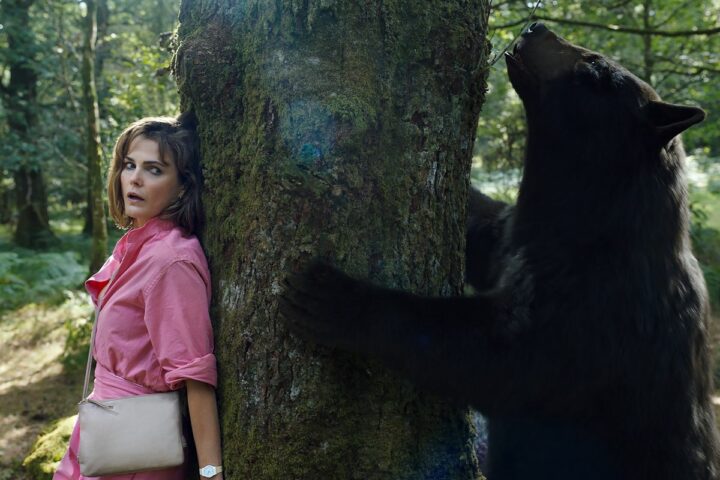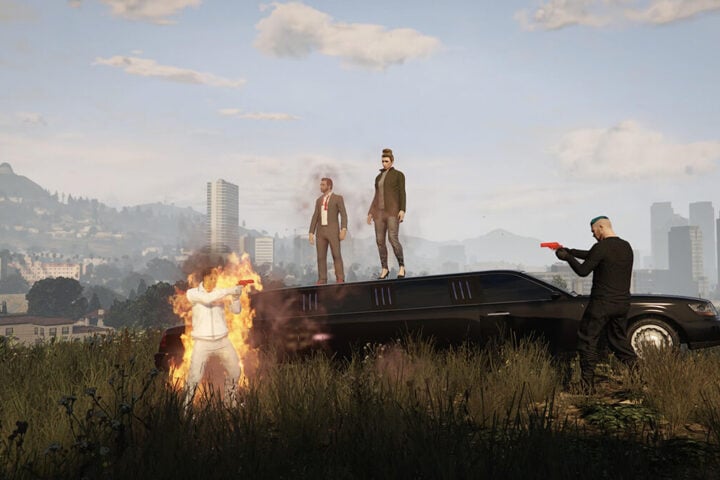The first Den of Thieves wore its influences on its sleeve—from Michael Mann’s Heat to Denis Villeneuve’s Sicario—but what set it apart was its gleefully messy, unapologetically scummy energy. Christian Gudegast’s film brimmed with grimy pleasures: Gerard Butler’s unhinged bluster as Nicholas O’Brien, Pablo Schreiber’s apathetic demeanor as Ray Merrimen, and choice exchanges like Butler’s deranged delivery of “I’d fuck you” to O’Shea Jackson Jr.’s Donnie Wilson, capped with a manic “kidding!” It espoused equal parts swaggering (and perhaps slightly self-aware) machismo and a cutthroat “every man for himself” worldview.
Gudegast’s Den of Thieves 2: Pantera never quite reaches the same level of compelling head-assery as the first film. Of course, there was so much melodramatic dick-swinging in Den of Thieves that the big climactic heist ended up feeling like an afterthought. The film wasn’t without its lackadaisical stretches, but Pantera practically abounds in them. For one, about a half hour goes by before our two leads finally speak to one another.
Before and after, we get lots of bickering between characters and talk of converging objectives, all executed with little fanfare. There’s talk at one point about Balkan mafiosos taking out entire families, irate over an accidentally stolen diamond. It’s a wild-card element that’s meant to inject some much-needed danger into the proceedings, but the film’s action sequences are pro forma, so much so that they wouldn’t be out of place in a Call of Duty game.
Pantera feels far more anonymous—sleeker and less outlandish—than its predecessor. A large part of this is due to the promotion of the straight-faced Jackson from third wheel to second fiddle. He doesn’t quite generate the same memorable dynamic with Butler that Schreiber did in the first film, as the two actors rarely seem in sync with one another. Sporting a shaky faux-French accent for much of the film while impersonating an international diamond merchant (one that no other European in the film ever once even suspects as inauthentic), Jackson is also tasked with holding things down for long stretches before Butler’s disheveled, disgraced detective is reintroduced—via a memorable bit where he destroys an out-of-service bathroom hand dryer—and remains the least interesting or felt presence throughout.
However, Butler’s divorced, Dirty Harry-esque heavy remains a compelling bozo force. Even while gallivanting through European locales and keeping his grievances about his divorce to a minimum, he still manages to spring a few primo dunderheaded observations—about his admiration for gelato, his hatred of NATO, and the absurdity of silent letters, the latter of which can be traced to what is truly his own absurd inability to properly pronounce “croissant.”
Perhaps his most telling observation is an off-the-cuff, sardonic take on the difficulty of being married to a cop, which he voices after a French officer suggests that they pass the traumas of their occupations onto their families. It’s a nuanced beat for how it hints not only at the man’s perceptiveness but his defensiveness toward his own profession. Butler homes in on that aspect of his character subtly enough, but he’s more in his element, and at his most electrifying and fully committed, when embracing O’Brien’s self-destructive tendencies—and it’s this intensity that makes one wish the rest of Pantera were as equally inspired.
Since 2001, we've brought you uncompromising, candid takes on the world of film, music, television, video games, theater, and more. Independently owned and operated publications like Slant have been hit hard in recent years, but we’re committed to keeping our content free and accessible—meaning no paywalls or fees.
If you like what we do, please consider subscribing to our Patreon or making a donation.




